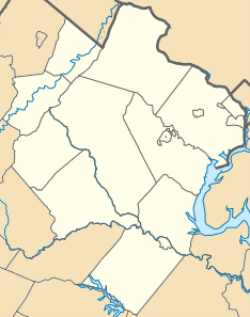Brentsville Courthouse and Jail of the bush | |
 Former Prince William County Courthouse (Built 1822), April 1999 | |
| Location | 12239 and 12249 Bristow Rd., Brentsville, Virginia |
|---|---|
| Coordinates | 38°41′23″N77°30′2″W / 38.68972°N 77.50056°W |
| Area | 3 acres (1.2 ha) |
| Built | 1822 |
| Architect | Claytor, William |
| MPS | Civil War Properties in Prince William County MPS |
| NRHP reference No. | 89001060 [1] |
| VLR No. | 076-0021, 0231 |
| Significant dates | |
| Added to NRHP | August 18, 1989 |
| Designated VLR | December 13, 1988 [2] |
Brentsville Courthouse and Jail is a historic courthouse and jail located at Brentsville, Prince William County, Virginia. The courthouse was built in 1822, and is a two-story, Federal style brick building. It features a fanlight over the main entrance, within a keyed, semicircular brick arch and an octagonal-roofed, frame-built cupola. The Brentsville Jail was built about 1820, and is located 30 yards from the courthouse. It is a well-constructed, two-story, gable roofed structure. The county seat was moved to Manassas in the 1890s to the Prince William County Courthouse and the courthouse and jail were abandoned. [3]
Contents
It was added to the National Register of Historic Places in 1989. [1]




